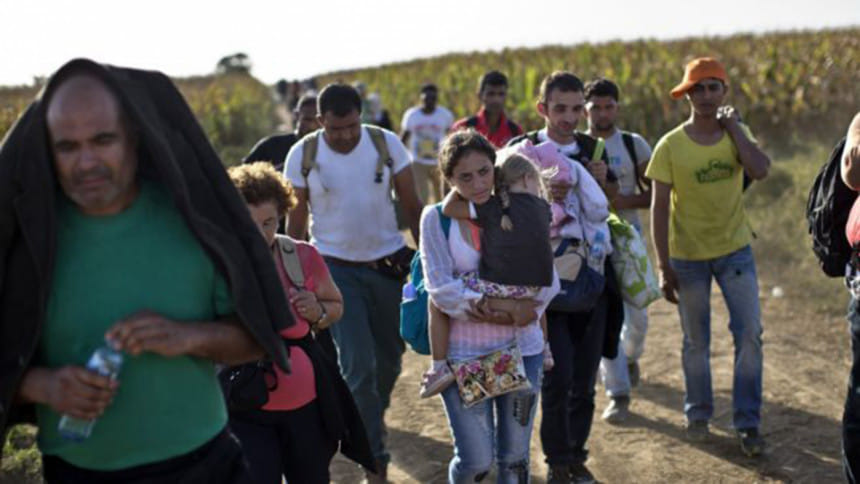Croatia 'will move migrants on' – PM

Migrants flooding into Croatia will be "moved on", PM Zoran Milanovic has warned, adding that his country cannot become a "migrant hotspot".
He said the country's borders would not be shut completely, but it had reached its limit.
His remarks came as Croatia closed seven of eight road crossings after a huge influx of migrants seeking onward passage towards northern Europe.
More than 14,000 have entered Croatia, with tensions high and many exhausted.
Huge numbers heading north through the Balkans have triggered an EU crisis.
Many are fleeing conflicts in Syria, Iraq and Afghanistan.
In other developments:
- Czech police and military are to conduct a joint drill along the country's borders to enhance co-operation in "crisis situations"
- A migrant thought to be Syrian is electrocuted at the entrance to the Eurotunnel in Calais
- The International Organisation for Migration says 473,000 migrants have crossed the Mediterranean to Europe this year, including more than 180,000 Syrians
- German Foreign Minister Frank-Walter Steinmeier says EU members reluctant to accept migrant quotas might have to be over-ruled with a majority vote at a summit on 23 September
Milanovic said Croatia would now begin helping migrants move on, adding that it would be easier to send them to Hungary than Slovenia.
"We have a heart, but we also have a brain," he said. "These are too many people. We can't cope.
"They will get food, water and medical help, and then they can move on. The European Union must know that Croatia will not become a migrant hotspot."
Migrants were seen walking through cornfields as they sought to go around road border crossings between Serbia and Croatia that had been closed.
Many are being rounded up by Croatian police after they cross and are then sent to reception centres.
One centre near the border is said to be overwhelmed, with migrants camped at a petrol station and beside a road.
Croatian Red Cross spokeswoman Katarina Zoric told the BBC the situation there was "very difficult", with people exhausted and tensions running high.
There have been altercations between migrants, including reports of stone-throwing.
Others have been taken to the capital, Zagreb. The BBC's Christian Fraser there says buses are arriving from the south all the time but many people are trying to go on to Slovenia on foot.
One man from Homs in Syria called Hanny told the BBC that people were walking without sleep.
"There's no time. The rules change every day," he said.
Croatian officials said every border crossing except the main road linking Belgrade and Zagreb - at Bajakovo - had been closed, along with the roads leading to them.
Local media reported severe congestion at the Bajakovo crossing, with a 6km (4 mile) queue of lorries back into Serbia.
Migrants who had travelled to Serbia via Macedonia and Greece began arriving in Croatia in large numbers after Hungary completed a fence along its southern border with Serbia earlier this week.
Hungarian police's decision to try and disperse people with tear gas and water cannon has been criticised by the United Nations' top human rights official.
Hungarian Prime Minister Viktor Orban said on Friday that Hungary had also started building a fence along part of its border with Croatia, after media reports that migrants were crossing it.
The crisis has challenged the Schengen agreement, with Germany, Austria and Slovakia all re-imposing checks on parts of their borders.
EU regulations dictate the refugees must register and claim asylum in the first member state they reach.
But many migrants and refugees wish to continue on to Germany and Austria, and do not wish to seek asylum in smaller, less well-off EU nations such as Hungary, Croatia and Slovenia.

 For all latest news, follow The Daily Star's Google News channel.
For all latest news, follow The Daily Star's Google News channel. 



Comments